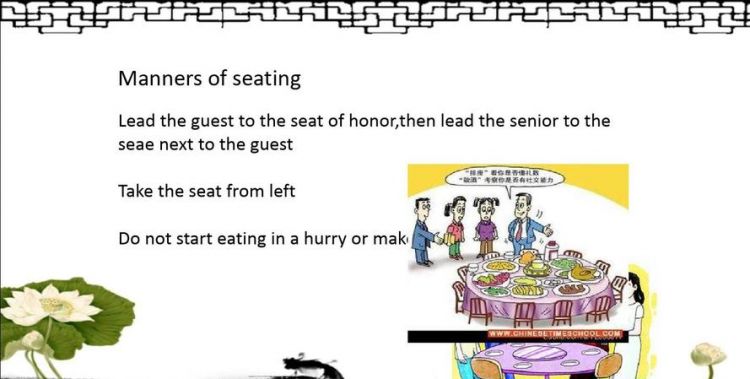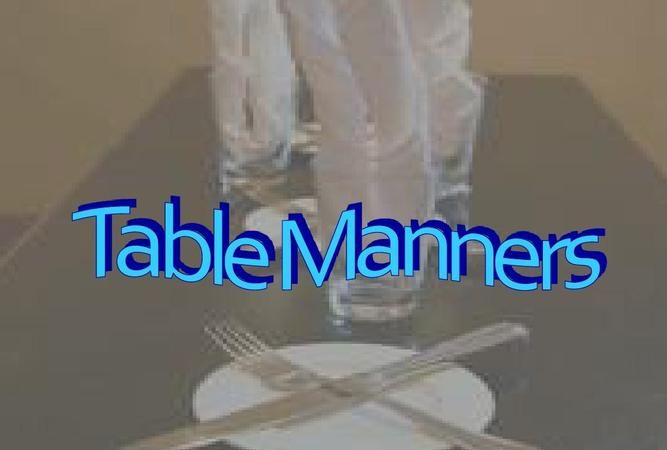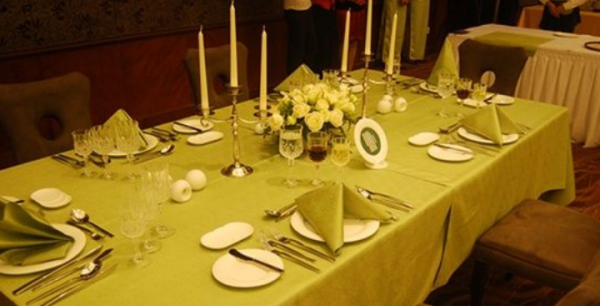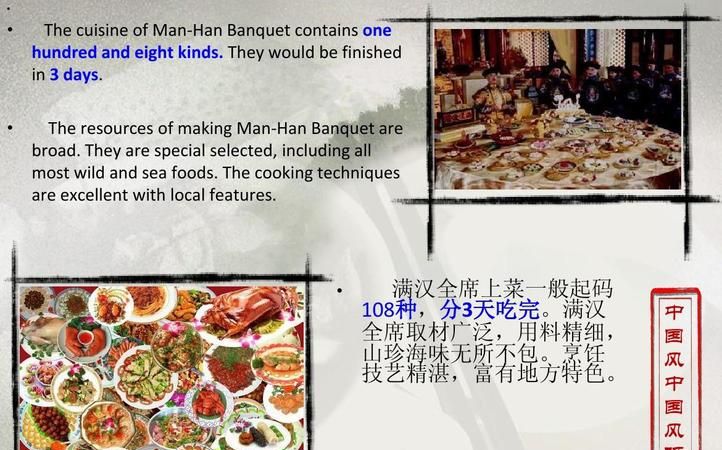本文目录
中国餐桌礼仪英语10句简单
1.让客人和长辈先吃每一道菜
let the elder people and the customer eat first
2.不要用筷子敲碗
don't use the chopsticks hit the bowl
3.不要将手伸到饭桌对面夹菜
don't reach to get the food on the opposite side
4.等大家到齐了,才开始吃
don't eat until everyone is there
5.为主人的长寿、健康、成功干杯
wish for the people who host the dinner
久仰,久仰!
I have long been looking forward to meeting you.
I have long desired to meet you.
久违了。
I haven’t seen you for ages/for a long time.
It’s been such a long time since we met last time.
久闻大名。
I’ve heard a lot about you.
这次由我负责全程陪同你们。
I will be with you for the entire visit/trip.
欢迎你到中国来。一路上辛苦了! / 一路上还好吧?
Welcome to China.I hope you’ve had a good flight.
或I hope you enjoyed your flight. / How was your journey?
谢谢你专程来接我。
Thank you very much for coming all the way to meet me.
您贵姓?/您怎么称呼?
May I know your name,please?
很高兴见到你。您怎么称呼7
Glad/Pleased to meet you,Misterr…?(可以用拖长问话的办法来询问对方的姓名)
中国有句古话说:“有朋自远方来不亦乐乎?”
There’s an old saying in Chinese which goes: “Isn’t it a great pleasure/joy to have friends coming from afar?
As a Chinese saying goes, “Nothing is more delightful than meeting friends from far away.”
这是给您准备的日程安排.我们简单过一遍吧。如果你有什么特殊要求.也可以告诉我。
This is the tentative itinerary/schedule I have prepared for you.Let’s go through it
together.If there is any special request,just let me know.
如果有什么需要帮忙的.尽管说。
If you need anything,don’t hesitate to ask.
Just let me know if you need anything.
我们安排你住在城里的……酒店.离我们公司开车要走40分钟。
We’ve arranged for you to stay in…Hotel,which is in the downtown area,about 40- minute drive from our company.
我们也有宾馆,不过条件不如酒店。离单位倒是很近.走路就可以到。
We have our own guest house,but there is no comparison between the two, only the guest house is within walking distance of the workplace.
除了正式会谈以外.我们也为大家安排了一些游览活动。
In addition to official meetings,we have also arranged some sightseeing.
我期待着您的再次来访。
I’m looking forward to your visit again.
代我向……问好。
Remember me to… / Say hello to…for me.
不用谢,这是我们应该做的。
Don’t mention it. It’s my pleasure.
欢迎再来!
Do come again.

中国有哪些餐桌礼仪
中国的基本餐桌礼仪:
内有主要壁画的,正背对壁画的位置为主人位,在中国,正式的餐会,以主人正对面为主客,非正式的,中国人喜欢亲密,客人会坐在主人旁边。
主人先动筷
中国人吃饭 一般是圆桌
中国人吃饭 喜欢劝酒
中国人吃饭 喜欢热闹
中国人吃饭 不会吃光光
中国人吃饭 鱼头对着主人

关于餐桌礼仪的英语单词
有关餐桌礼仪的英语单词如下:
1、碟子:saucer; small plate; small dish
2、女主人:hostess; mistress; goodwife; woman of the house; housemistress
3、离席:leave the table or a meeting
4、汤盘:soup plate; soup dish
5、服务生:a boy in buttons
6、餐巾:(table) napkin; dinner cloth
7、油渍:oil stain
8、坐定:take seat; be sure
9、可使用:workability; workableness; in commission
10、摊开:spread out; unfold; lay open

具体的餐桌礼仪介绍如下:
1、撕面包时,碎屑应用碟子盛接,切勿弄脏餐桌。
翻译:when the bread is torn, the chips should be used to hold the dishes. Do not dirty the table.
2、用餐后,须等男、女主人离席后,其他宾客方可离席。
翻译: after dinner, wait for the male and female hostess to leave, the other guests can leave.
3、面包切用刀子割。
翻译:cut the bread with a knife.
4、如面包是烤热的,可以整片先涂牛油,再撕成小片吃。
翻译:if the bread is roasted hot, the whole piece can be first coated with butter and then ripped into small pieces.
5、汤将见底,可将汤盘用左手拇指和食指托起,向桌心,即向外倾斜,以便取汤。
翻译:The soup will reach the bottom. The soup tray can be held up with the left thumb and forefinger and tilted outward toward the center of the table so as to fetch the soup.
6、在饭店用餐,应由服务生领台入坐。
翻译:Dining in restaurants should be served by the waiter.
7、餐巾主要防止弄脏衣服,兼做擦嘴及手上的油渍。
翻译:napkins mainly prevent dirty clothes, and do wipe the mouth and hands of oil stains.
8、必须等大家坐定后,才可使用餐巾。
翻译:you must wait until you have settled down before you can use napkins.
9、餐巾摊开后,放在双膝上端的大腿上,切勿系入腰带,或挂在西装领口。
翻译:After the napkin is spread out, put it on the thigh on the top of your knees. Do not tie it in the belt or hang it on the collar of the suit.
10、餐毕,宜将餐巾折好,置放餐桌上再离席。
翻译:when the meal is finished, fold the napkin and put it away on the table.
现在我来告诉你一些中国的餐桌礼仪英语
China Dining Custom
Table Manners
The main difference between Chinese and western eating habits is that unlike the West, where everyone has their own plate of food, in China the dishes are placed on the table and everybody shares. If you are being treated by a Chinese host, be prepared for a ton of food. Chinese are very proud of their culture of cuisine and will do their best to show their hospitality.
And sometimes the Chinese host use their chopsticks to put food in your bowl or plate. This is a sign of politeness. The appropriate thing to do would be to eat the whatever-it-is and say how yummy it is. If you feel uncomfortable with this, you can just say a polite thank you and leave the food there.
Eating No-no's
Don't stick your chopsticks upright in the rice bowl.Instead,lay them on your dish. The reason for this is that when somebody dies,the shrine to them contains a bowl of sand or rice with two sticks of incense stuck upright in it. So if you stick your chopsticks in the rice bowl, it looks like this shrine and is equivalent to wishing death upon a person at the table!
Make sure the spout of the teapot is not facing anyone. It is impolite to set the teapot down where the spout is facing towards somebody. The spout should always be directed to where nobody is sitting, usually just outward from the table.
Don't tap on your bowl with your chopsticks.Beggars tap on their bowls, so this is not polite.Also, when the food is coming too slow in a restarant, people will tap their bowls. If you are in someone's home,it is like insulting the cook.
Drinking
Gan Bei! (Cheers! “Gan Bei” literally means “dry [the] glass”) Besides beer, the official Chinese alcoholic beverage is Bai Jiu,high-proof Chinese liquor made from assorted grains. There are varying degrees of Bai Jiu. The Beijing favorite is called Er Guo Tou, which is a whopping 56% alcohol. More expensive are Maotai and Wuliangye.
-
-
- -
--------------------------------------------------------------------------
Of course, the main difference on the Chinese dinner table is chopsticks instead of knife and fork, but that’s only superficial. Besides, in decent restaurants, you can always ask for a pair of knife and fork, if you find the chopsticks not helpful enough. The real difference is that in the West, you have your own plate of food, while in China the dishes are placed on the table and everyone shares. If you are being treated to a formal dinner and particularly if the host thinks you’re in the country for the first time, he will do the best to give you a taste of many different types of dishes.
The meal usually begins with a set of at least four cold dishes, to be followed by the main courses of hot meat and vegetable dishes. Soup then will be served (unless in Guangdong style restaurants) to be followed by staple food ranging from rice, noodles to dumplings. If you wish to have your rice to go with other dishes, you should say so in good time, for most of the Chinese choose to have the staple food at last or have none of them at all.
Perhaps one of the things that surprises a Western visitor most is that some of the Chinese hosts like to put food into the plates of their guests. In formal dinners, there are always “public” chopsticks and spoons for this purpose, but some hosts may use their own chopsticks. This is a sign of genuine friendship and politeness. It is always polite to eat the food. If you do not eat it, just leave the food in the plate.
People in China tend to over-order food, for they will find it embarrassing if all the food is consumed. When you have had enough, just say so. Or you will always overeat!

以上就是关于中国的餐桌礼仪英文翻译 ,中国餐桌礼仪英语10句简单的全部内容,以及中国的餐桌礼仪英文翻译 的相关内容,希望能够帮到您。

